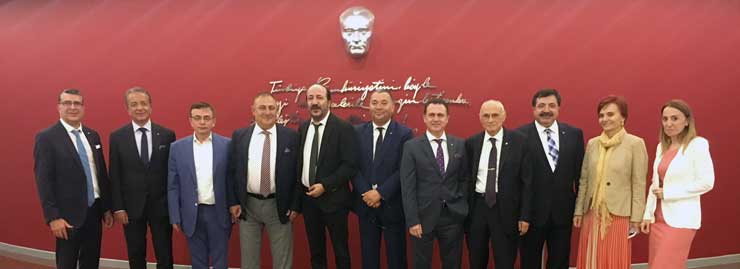News
ICI Chairman Bahçıvan Attracts Attention to the Control Lost in Trade Wars
- 27.06.2018
- News
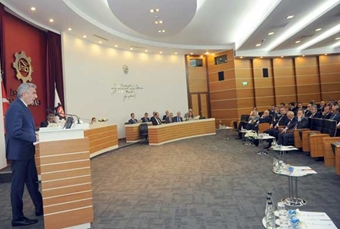
Istanbul Chamber of Industry (ICI) June Ordinary Assembly Meeting was held on 27 June 2018 in Odakule with the main agenda of "Looking at Economical Developments in the World and Türkiye in Respect of Our Industry's Priorities While Starting the Second Half of the Year". The Assembly Meeting chaired by ICI Vice President of Assembly - Hasan Büyükdede welcomed ICI Consultant, Economist Can Fuat Gürlesel.
ICI Chairman Erdal Bahçıvan underlined the control lost in trade wars and continued: "This state negatively impacts various groups extending from producers to consumers, exporters to importers. The protectionism that will lead nations to introversion with tougher retaliations is a precursor of big conflicts. We hope things won't come to that point for the sake of world peace and harmony." Bahçıvan also talked about the hottest topic of Türkiye, the elections, and the economy: "The elections are over. Now, it is export time for Türkiye. The main agenda should now be economy. We need to come up with permanent solutions and ensure financial stability by focusing on the main issues of our economy including exchange rate fluctuation, inflation and current deficit."

ICI Vice President of Assembly
Hasan Büyükdede
ICI June ordinary assembly meeting was opened by ICI Vice President of Assembly Hasan Büyükdede. Büyükdede shared his opinions regarding the agenda with Assembly Members:
"I wish the elections made last Sunday would bring good luck to Türkiye. The new system will bring new responsibilities to the business world. I think that Istanbul Chamber of Industry and our work groups will be very important in turning the focus to industry in the governance of Türkiye. As ICI, we had established 10 Assembly Work Groups. I would like to thank everyone, who had contributed to their establishment. I would like you to also participate to our survey to contribute to the selection of people, who will be welcomed by our Assembly every month."
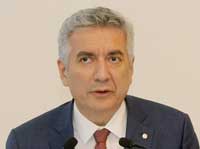
ICI Chairman Erdal Bahçıvan
Büyükdede invited ICI Chairman Erdal Bahçıvan to the stage to make his speech about the main agenda item. ICI President Bahçıvan stated that while precautions restricting trade are being taken reciprocally between two giant economies of the world - USA and China, this protectionism trend causes separation between USA and European countries, too. Bahçıvan stated that the widening of trade war scope and the hardening of showdown between countries about this subject are concerning in respect of the future of the global growth.
Reminding that USA will begin to apply additional duties on $34 billion of imports from China as of July 6, Bahçıvan stated that the product value that will be included in the fine if China reciprocates to this may climb up to $450 billion. Bahçıvan also reminded Trump's criticism of and in a way threats to Harley-Davidson for moving its production for the European market to overseas due to duties, and stated that protective precautions are being taken one after another in the recent weeks regarding different product groups also affecting the industrialists in neighbor markets Iran, Iraq and Jordan that closely concern them.

Stating that the control is lost in protectionism, Bahçıvan attracted attention to this state's negative impact on all parties extending from producers to consumers, exporters to importers and more importantly to the danger of undesired introversion in countries due to tougher retaliations accompanying this loss of control, surprise factor and unpredictability. Indicating that such high level of protectionism brings along great conflicts as the history had proven, Bahçıvan wished things to not reach such a point for the sake of world peace and harmony.
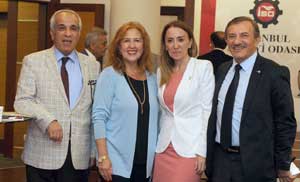
Stating that the real sector carries a higher risk in the balance structure due to the exchange rate increase, Bahçıvan underlined the significance of mechanisms that will enable effective management of this risk. Adding that high rates of commercial loan interests reaching up to 25 percent make it hard for the industrialists to make investments and increase the financing burden, Bahçıvan underlined that the increase of energy and commodity prices also challenged the industrialists in the same way.
Naming economy as the main agenda of Türkiye from now on, Bahçıvan stated that they need to come up with permanent solutions focusing on the main issues of the economy including exchange rate fluctuation, inflation and current deficit. Bahçıvan also recorded that it is extremely important to maintain financial stability in the new term.
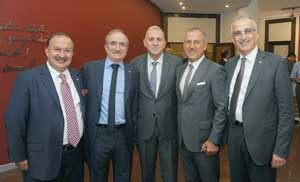
Attracting attention to the necessity of an effective economy management due to the need of solving these issues and maintaining financial stability, Bahçıvan shared their approval of the recently announced decision to simplify ministries by combining them. Bahçıvan said that it is required to take effective and result-oriented actions through better use of the consultation mechanisms of the new model, and named the establishment of the corporate infrastructure of a more efficient and more holistic economy policy as an important step.
Stating that Türkiye had achieved a certain level of success in economical growth, but still needs to establish a higher quality growth model to make this success sustainable, Bahçıvan said that what they need in the new term is a development mentality in line with this qualified growth.
Bahçıvan continued:
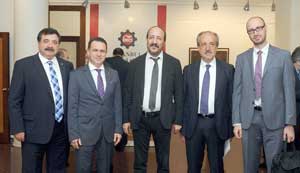
"There is no doubt that quality growth is based on quality production. Thus, it is very important to take concrete steps regarding production economy-oriented reforms. It is essential for us to achieve a significant transformation in the composition of our export. So, we find it very right and meaningful for AK Party to include the target of increasing the share of advanced technology products in export from 4 percent to 15 percent in its election manifesto. And our biggest need to be able to transition to a high-added value production structure that can compete with the rest of the world is a qualified education and a qualified man power. I believe that a people-oriented approach should create the basis of our new development mentality. Moving from this mentality, quality standards should be systematically followed in education, quality of the educators should be strengthened and importance must be attached to the vocational training as required.
And another pillar of qualified production is qualified finance. As Istanbul Chamber of Industry, we had shared our various suggestions regarding qualified finance with the public before. Among these suggestions, the creation of a next-generation development bank model fulfilling the financing need of advanced-technology investments of our industry continues to be the priority. In none of the countries of the world, there is a success story based on private sector banking. In all of the industrialized countries, we see the great importance of the public support to the industrial investments on the path to success. And the main means for this support are the development banks. I think it would be beneficial to once again state our need for a next-generation development bank here.
Another condition of the production structure that we desire is a qualified investment environment. The world needs an attraction center that assures both domestic and foreign investors, and attracts sustainable investments. In this sense, I would like to underline the necessity to attach importance to the inflow of foreign capital for permanent investments. "
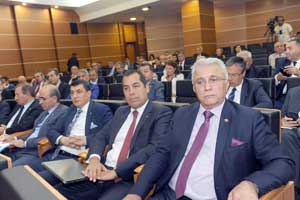
Naming another of their expectations as the solution of severance pay issue, which creates a significant burden on the industrialists, by taking the BES model as an example, Bahçıvan shared their hope for this solution that will be developed with the cooperation of all respective parties to be embraced both by the employers and the employees in the upcoming days.
Stating that the "Real Estate Industry" model that they had suggested recently regarding land allocation, one of the obstacles before investments in the industry, contains allocations of respective state lands to the private sector based on projects, Bahçıvan named one of the benefits of this practice as the guarantee that the respective land will be used as a plant for a while, and another one as the prevention of the use of these lands for unearned income.
Talking about the ever increasing deferred VAT burden as an important issue to be resolved, Bahçıvan underlined the fact that VAT is almost like an operating capital transfer to the public due to the limited resources of the industrialists. Bahçıvan stated their hope for the regulation regarding the payment of the deferred VAT receivables to the industrialists that had been discussed but later removed from the law, to be put into practice as soon as possible.
Naming another of their hopes and expectations as an effective struggle with unrecorded economy, Bahçıvan stated that unrecorded production causes low quality products to enter into the market on one side and cause unfair competition for industrialists paying their taxes on the other hand. Bahçıvan added that they find the targets of lowering unregistered employment and preventing various tax losses important.
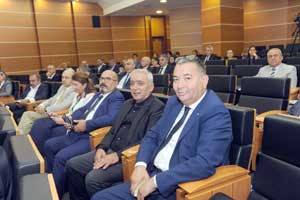
Bahçıvan named R&D, innovation, digital transformation and industrial zones as the most important subject titles of the next period for both Türkiye and the world, and continued: "We believe that the commercialization and brandization of R&D and innovation operations must be accelerated. In these days where production dynamics are restructured, we expect for a "digital transformation of production" strategy to be put into practice including incentive-support system, human resources and training policies. We find the efforts initiated last term very important. And we believe that our industry should prepare itself better for the upcoming technological change, digital transformation especially in R&D, and take higher share from the presented opportunities. Regarding industrial zones, we find it pleasing for the number of available industrial zones to increase. However, we also believe that it would be good to discuss realistic practices by considering the production culture and ecosystem in the zones where certain industrial branches are settled. On the other hand, we hope mega industrial zones to be put into practice as soon as possible to pave the way for especially large scale and integrated investments."
Bahçıvan reminded that they had entered into a period where even the resources of the world will not be abundant, leave aside the limitation of the resources in Türkiye. "Forget about the rich and cheap financial resources of the last decade." said Bahçıvan. "From now on, we should accept that we don't have much chance to diversity our resources. In this sense, I would like to underline that we now enter into a period that we need to use our own resources in a much efficient, meticulous, careful and quality-based manner through very accurate incentive models. Of course, Türkiye had invested significantly into infrastructure in the recent years. Some of these will definitely continue and they should. But, I believe that it is now time to convert the brand and models that we had created in the infrastructure projects recently into models that will make us a brand in the global industry. The visionary industrial modelings that are correctly defined, correctly encouraged and dominated with the correct financing alongside the huge infrastructure investments that we did will have huge contribution to the sustainable and qualified, technology-based growth of Türkiye."
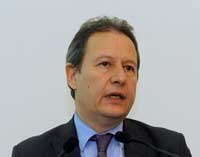
ICI Consultant Economist
Can Fuat Gürlesel
ICI Consultant Economist Can Fuat Gürlesel took the stage later and addressed to ICI Assembly Members regarding the main agenda of the meeting. Reporting the 3.3-3.5 percent growth of global economy, the peak of industrial production and the increase of employment rates in the first half of the year, Gürlesel forecasted that the second half will be as good as the first. Gürlesel named the isolation policy and trade protectionism practices as the obstacles before this growth.
Mentioning the great growth performances of both the developed and the developing countries, Gürlesel named industry as the greatest power behind this growth. Stating that the PMI data indicating the expectations in industrial production is extremely good, Gürlesel underlined the renewing industrial structure. Also mentioning the good pace in the global goods trade, Gürlesel stated that the growth achieved in 2017 had continued in the first five months of 2018, but the protectionism precautions may be restrictive and decelerating.
Talking about the price policies of FED and European Central Bank, Gürlesel said that the monetary expansion behind the global crisis had reversed. Stating their expectations for FED to reach 2.5 points by increasing the interest twice in 2018 and to 3.5 points in 2019, Gürlesel added that they will reach half of the 6.5 interest before the crisis. Gürlesel attracted attention to the fact that the dollar financing will get more expensive within this period.
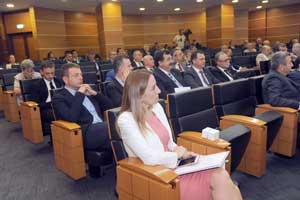
Stating that the commodity prices had an upward trend due to the increasing demand since the beginning of the year, Gürlesel said that the prices may be dropped because of protectionism. Also talking about the rise in oil prices, Gürlesel recorded that risks regarding Iran had contributed to this result. Underling the great risk to the global trade caused by the withdrawal of USA from international contracts, its separation from its Western allies and withdrawal from Iran nuclear agreement and its protectionism precautions, Gürlesel stated that responds to protectionism precautions from Asian countries may lead to trade wars.
Talking also about the economical agenda after elections in Türkiye, Gürlesel stated that Türkiye has been applying an inflationary growth policy for the last two years and this is not sustainable. Naming some of the issues of Türkiye as inflation, foreign trade deficit, current deficit and budget deficit, Gürlesel stated that they had entered into the cycle of inflation, foreign currency and interest that breed each other as in the days before 2002. Reporting the debt stock of the real sector as 295 billion dollars, Gürlesel said that the loan user firms to mostly have TL income is a huge risk. Underlining the necessity to embrace an approach similar to Istanbul approach in 2002 instead of bank - real sector conflict, Gürlesel stated that the banking industry is under threat.
Stating that the CDS score of Türkiye is higher than 300 and this level indicates a bankruptcy risk before the foreigners, Gürlesel said that only Argentina, Ukraine and Türkiye are above this level in the world. Declaring the bond yield with 10 year term as 16.92, Gürlesel named Türkiye as the country with the highest debt with its own currency. Mentioning that there are two alternatives before Türkiye, Gürlesel named the first alternative as restricting consumption and supporting producers and exporters through a strict money policy and structural reforms, and the second alternative as creating a temporary dynamism through an expanding money policy and inflationary growth, and added that the second alternative may lead Türkiye to the crisis in the end of the year.
Following these speeches, ICI Assembly Members took the stage to share their ideas about the main agenda item.
